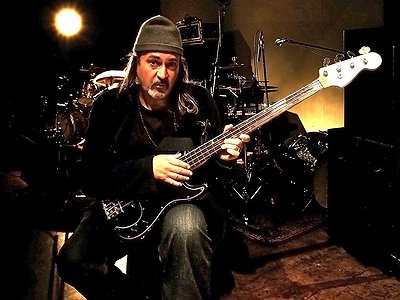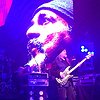Part 1: Interview with Bill Laswell
Name: Bill Laswell
Nationality: American
Occupation: Bassist, Producer
Current album: Bill Laswell & Masahiro Shimba: Dubopera
Labels (selection): AXIOM, Fax, M.O.D., Sub Rosa, Tzadik
Bands (selection): Axiom Funk, Material, Massacre, Tabla Beat Science
When did you start playing your instrument, and what or who were your early passions or influences?
I started playing electric bass around 12 or 13. Playing in live bands by 14 I chose music to avoid becoming a criminal. Based on my overall outlook at the time I felt I only had 2 options.
As far as early passions or influences … Bass players, I remember Duck Dunn and Chuck Rainey in the beginning. And later on Jack Bruce, mainly for his aggressive approach.
For most artists, originality is first preceded by a phase of learning and, often, emulating others. What was this like for you? How would you describe your own development as an artist and the transition towards your own voice?
Originality is crucial. As far as a phase of learning, emulating others should be held at a minimum. The danger of being a copy exists. Gurdjieff said “learning can tie you up, keep you back, knowing is direct when there is nothing between you and what you know …” Development was intuitive for me and mysterious.
The means to express yourself should be born of life experience. The secret of fascination, the unknown, the nagual.
Tell me about your instrument, please. How would you describe the relationship with it? What are its most important qualities and how do they influence the musical results – and possibly even your own performance?
My instrument is a tool, an object … used to build, construct and deconstruct … used to express ideas, options, light, dark, make it rain … Art is not a mirror, it is a hammer.
Many artists feel as though, at some point, certain people gave them the ”permission to do certain things”. How was that for you – in which way did the work of particular artists before you “allow” you to take decisions which were vital for your creative development?
I missed the “permission to do certain things” phase … as well as being “allowed” to take decisions (didn’t happen …). I was encouraged by certain artists (not just musicians) to realize you can do what you want as long as you don’t give up.
What were some of your main artistic challenges when starting out as an artist and in which way have they changed over the years?
Artistic challenges never really stop. They change constantly, as it should be.
What do improvisation and composition mean to you and what, to you, are their respective merits?
Real improvisers have a constantly moving repertoire, language, multiple languages that interact … transmutation, time travel … Composition as solid defined existing form … by means of notation, sealing memory. Improvisation, once recorded is also a fixed form, contained and can be repeated endlessly as the same piece everytime.
The art of notation – composition
The art of recording – composition
Improvised composition as future music
How do you see the relationship between sound, space and performance and what are some of your strategies and approaches of working with them?
Sound, space and performance, all part of the same projection.
Derek Bailey defined improvising as the search for material which is endlessly transformable. Regardless of whether or not you agree with his perspective, what kind of materials have turned to be particularly transformable and stimulating for you?
I totally agree with Derek’s perspective. There are many ways to word this statement of course. All materials are transformable … simulacra and simulation. And Derek Bailey was a total original … one of the very special few.
Purportedly, John Stevens of the Spontaneous Music Ensemble had two basic rules to playing in his ensemble: (1) If you can't hear another musician, you're playing too loud, and (2) if the music you're producing doesn't regularly relate to what you're hearing others create, why be in the group. What's your perspective on this statement and how, more generally, does playing in a group compare to a solo situation?
On John Stevens – I don’t agree with rules in music and sound.
(1) I always play too loud.
(2) The musicians should relate if they’re directly communicating.
All group configurations are different … unless you are repeating yourself. Solo is very different and personal, I haven’t done that as much as I would like to … In the duet phase at the moment, with John Zorn, Milford Graves, Wadada Leo Smith, Colin Stetson and others.
With more and more musicians creating than ever and more, what does this mean for you as an artist in terms of originality? What are some of the areas where you currently see the greatest potential for originality and who are some of the artists and communities that you find inspiring in this regard?
There are many original artists. Unfortunately, there are many more than that who have no voice. The potential is anywhere and everywhere, scattered among the pointless disappointments (navigate).
What constitutes a good live performance in your opinion and what’s your approach to performing on stage? How do an improvisation and the recording of this improvisation compare?
A good live performance at it’s best should be magical, the power of direct
transformation. If anyone connects on a higher level, life can change. Comparing improvisation and the recording of improvisation … an environment or pushing a button should not make a difference … if everyone is totally inside the music. It’s the same.
Listening is also an active, rather than just a passive process. How do you see the role of the listener in the musical communication process?
Listening is fundamental … can be the whole story. Also playing independent and not listening or communicating with others can be another way … Doesn’t work for everyone however.
How do you see the relationship between music and other forms of art – painting, video art and cinema most importantly - and in how far, do you feel, does music relate to other senses than hearing alone?
All forms of expression and creativity are deeply connected. Painting, writing and film can all resonate sonically … (vibration), hallucination. Music can cast images, shapes, patterns, simulate transformation, and hallucination again. Sound – the ultimate drug.
Reaching audiences usually involves reaching out to the press and possibly working with a PR company. What's your perspective on the promo system? In which way do music journalism and PR companies change the way music is perceived by the public?
The promo system ... I usually become very active with PR when there is an active label in place which is the case at the moment. I think it’s very important. It makes people aware of the music. Good journalism can help a lot … It’s said that “all press is good press”, which is totally not true. I’m not sure how PR effects sales but hopefully on some level, it does something.
Do you have a musical vision that you haven't been able to realise for technical or financial reasons – or an idea of what music itself could be beyond its current form?
Not so much a musical vision, more like a plan or idea that could be realised, financial reasons are usually the reason projects don’t happen … and do happen.
Music can always be beyond it’s current form.
Beyond – great word …
Current form – not so exciting.
Please recommend two artists to our readers which you feel deserve their attention.
It’s impossible to focus on only 2 artists, where are so many … Information on artists and music is very easy to access today. Most of the great musicians … your readers are aware of. I also feel that the greatest music is coming. Look for new artists and don’t forget the masters. Stay conscious, stay available … A light will come on.
Art is the word that light writes in space.






